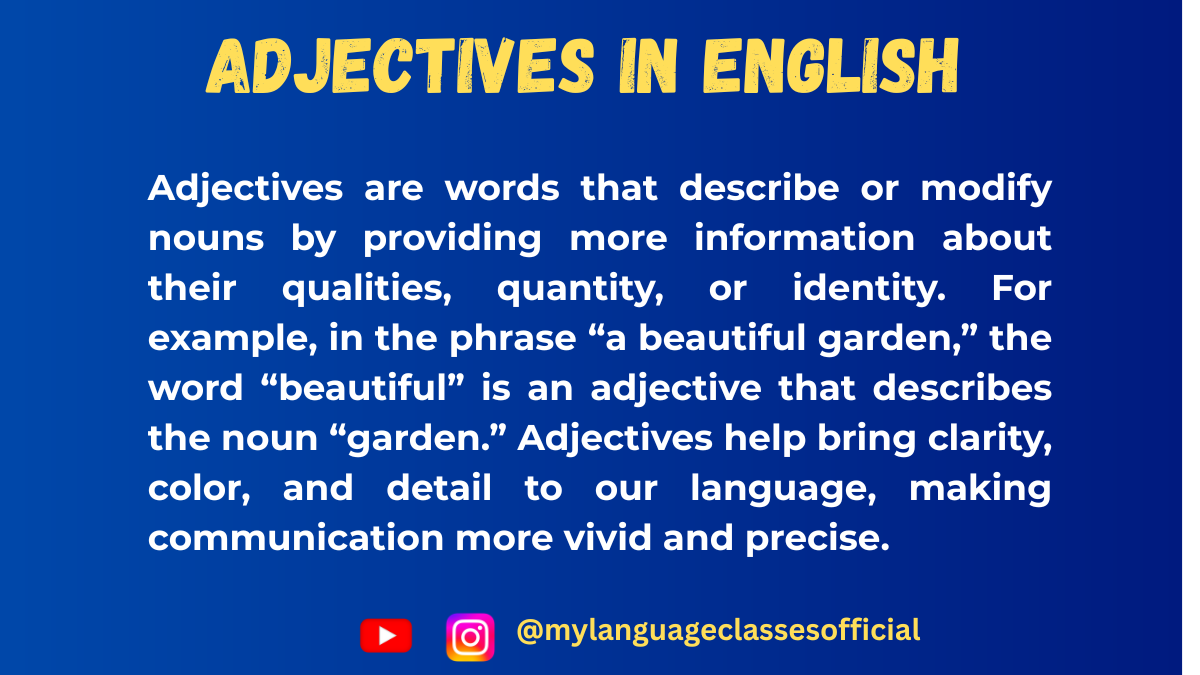Your cart is currently empty!
Tag: English adjectives examples
-

Adjectives and Their Usage in English
Adjectives are an essential part of the English language, as they describe or modify nouns and pronouns. They help provide more details about objects, people, and situations, making communication more effective and precise. In this blog, we will explore the different uses of adjectives, their types, and various rules associated with them.
Usage of Adjectives in Different Situations
1. Before a Noun (Attributive Position)
Adjectives are commonly placed before the noun they modify.
- Example: The red car is fast.
- Example: She has a beautiful house.
2. After a Linking Verb (Predicative Position)
When an adjective follows a linking verb (be, seem, look, become, etc.), it describes the subject.
- Example: The weather is cold.
- Example: She looks happy.
3. With Articles (a, an, the)
Adjectives follow articles when used before a noun.
- Example: I saw an interesting movie.
- Example: She adopted a cute puppy.
4. Adjectives and Gender
English adjectives do not change based on gender, unlike some other languages.
- Example: He is a smart boy. / She is a smart girl.
5. Adjective Order
When multiple adjectives are used together, they usually follow this order: Opinion → Size → Age → Shape → Color → Origin → Material → Purpose → Noun
- Example: A beautiful small old round red Italian wooden dining table.
6. Adjectives as Comparatives and Superlatives
- Comparative adjectives compare two things: This book is more interesting than that one.
- Superlative adjectives indicate the highest degree: This is the most beautiful dress I own.
7. Adjectives in Exclamations
- Example: What a wonderful surprise!
- Example: How beautiful the sunset is!
8. Adjectives with Quantifiers
Adjectives can be used with quantifiers to indicate amounts.
- Example: She has many expensive dresses.
- Example: I ate some delicious food.
9. Adjectives in Idioms and Expressions
- Example: He has a heart of gold.
- Example: She is a big deal in the industry.
10. Adjective-Noun Agreement (Singular/Plural)
Adjectives remain the same for singular and plural nouns.
- Example: The old man is wise. / The old men are wise.
List of Adjectives (Beginner & Intermediate Level) with Example Sentences
Adjective Example Sentence 1 Example Sentence 2 Happy She looks happy today. A happy child played in the park. Beautiful The garden is beautiful. She wore a beautiful dress. Tall He is a tall man. That building is very tall. Bright The sun is bright. She has a bright smile. Fast This car is fast. He runs very fast. Cold It is very cold today. I drank cold water. Small The small puppy is cute. He lives in a small house. Strong He is a strong athlete. This bridge is strong. Brave The brave soldier fought. She is a brave girl. Kind She is a kind person. His kind words made me smile.
More Example Sentences
- The soft blanket kept me warm.
- This is the best pizza I have ever eaten.
- She wore a bright yellow dress.
- He has a sharp mind.
- The baby has tiny hands.
- I bought a comfortable chair.
- The delicious cake was homemade.
- The lazy cat slept all day.
- His intelligent remarks impressed everyone.
- The noisy kids played outside.
Fill in the Blanks
- She is wearing a ____ dress. (beautiful/beautifully)
- The weather is very ____. (cold/coldly)
- He is a ____ boy. (brave/bravely)
- The ____ cat sat on the sofa. (lazy/lazily)
- This is the ____ movie I have ever watched. (interesting/more interesting/most interesting)
- He gave me a ____ smile. (kind/kindly)
- We stayed in a ____ hotel. (luxurious/luxuriously)
- She is ____ than her sister. (taller/tallest)
- The cake was ____. (delicious/deliciously)
- The ____ student answered all questions correctly. (smart/smartly)
Answers
- beautiful
- cold
- brave
- lazy
- most interesting
- kind
- luxurious
- taller
- delicious
- smart
Things to Keep in Mind
- Adjectives do not change with gender or number.
- Use adjectives in the correct order when using multiple adjectives.
- Comparative and superlative adjectives have specific rules (-er/-est, more/most).
- Adjectives can be placed before a noun or after a linking verb.
- Some adjectives are absolute (e.g., unique, perfect) and do not take comparatives or superlatives.
- Be careful with adjectives ending in -ing and -ed (e.g., boring vs. bored).
Conclusion
Adjectives play a crucial role in enhancing communication by providing more details about nouns. Understanding their usage in different situations, following adjective order, and learning comparative and superlative forms will help you use adjectives more effectively. With practice, you can master the art of using adjectives to make your speech and writing more descriptive and engaging!
If you enjoyed this lesson, be sure to check out more posts like this on my blog at My Language Classes. Don’t forget to subscribe my YouTube channel and follow me on Instagram for the latest language learning tips and lessons. Leave a comment below to share your thoughts, or ask any questions you have about nouns.
Happy learning! 😊
